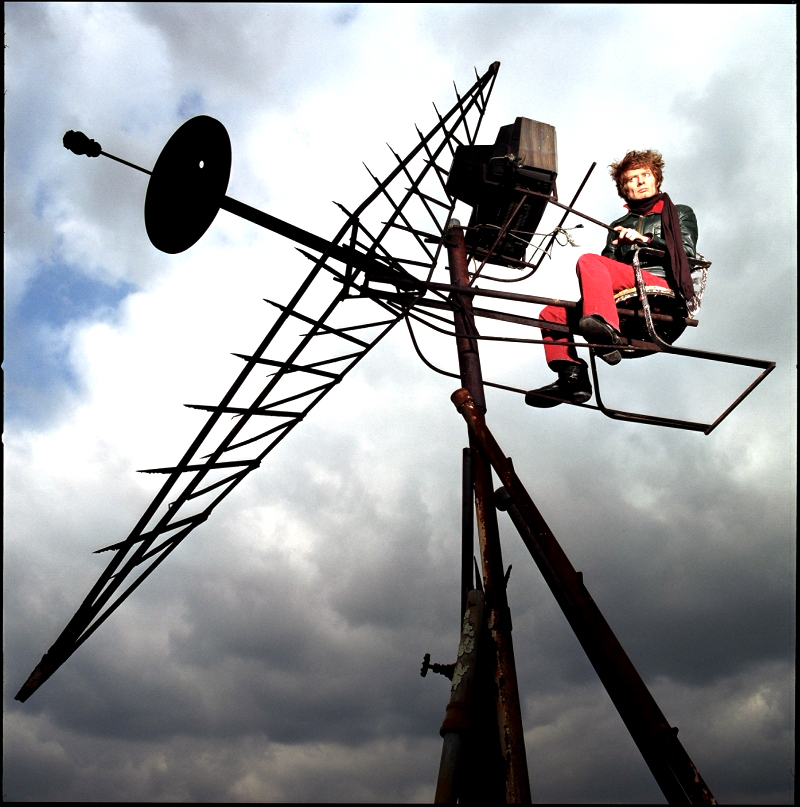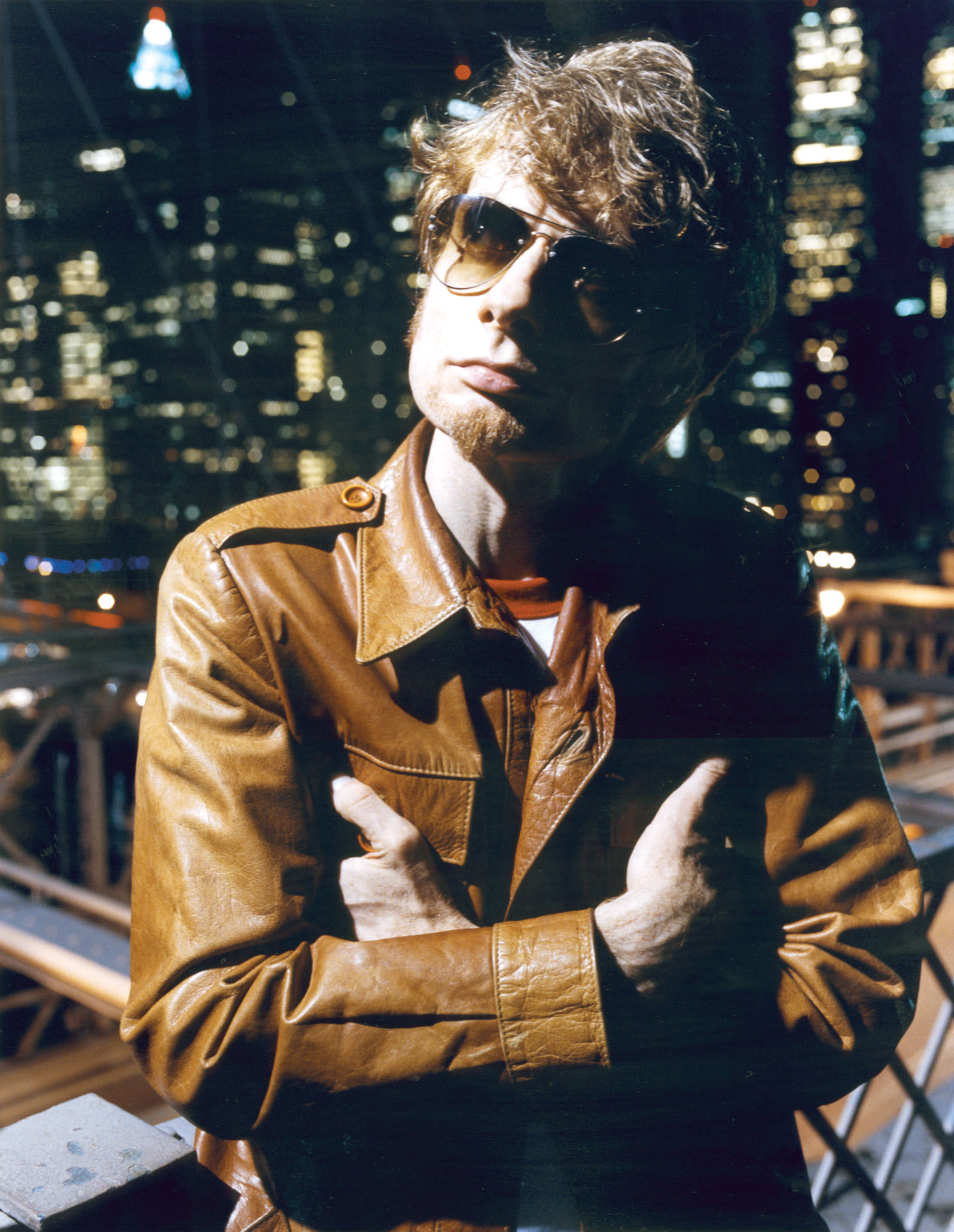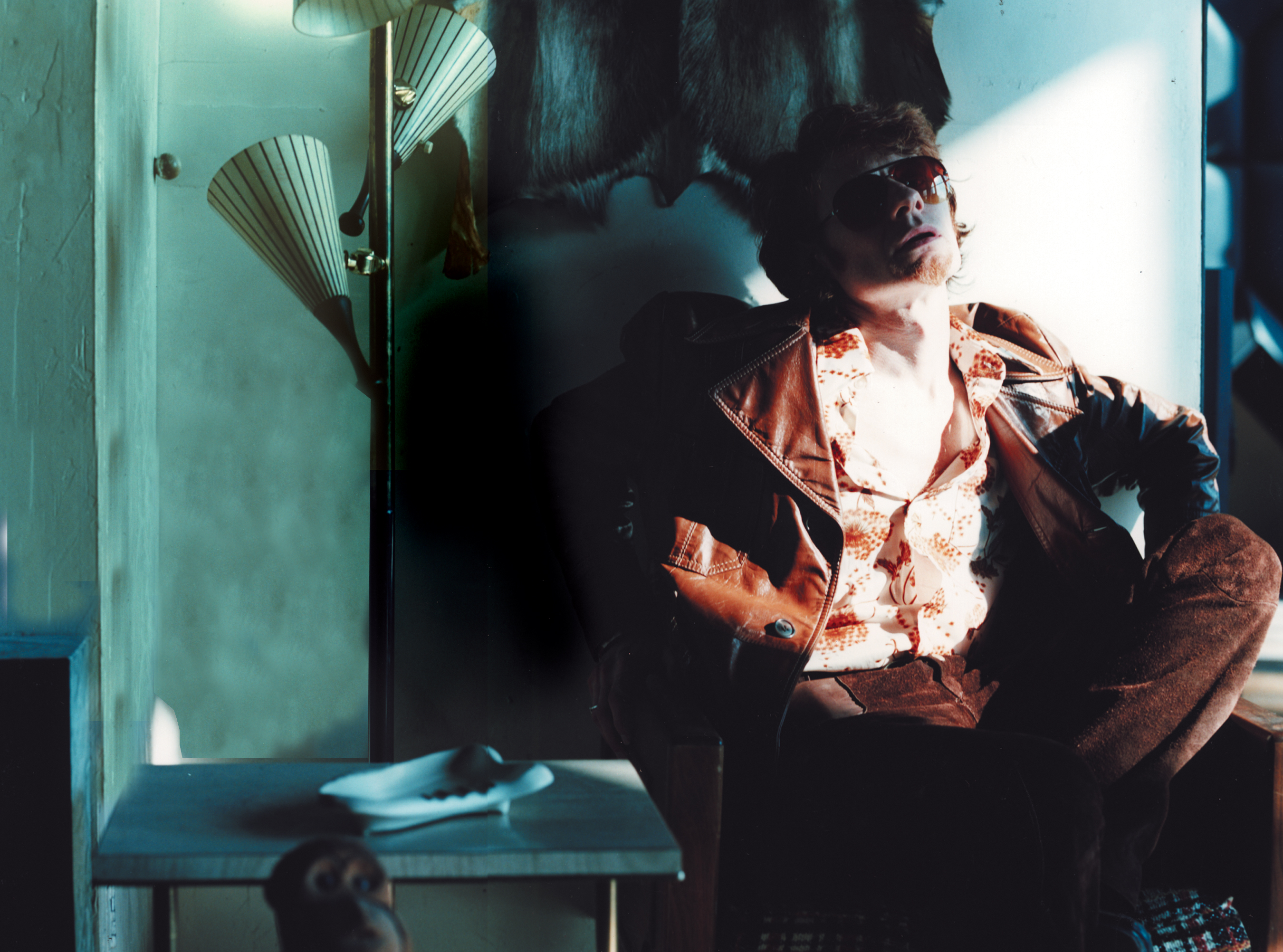Image in Post Caption Taken by: Philip Lethen
A man so prolific, yet he remains unknown. His name is attached to more releases than I can even imagine; be it performing, producing, mixing, re-mixing or just given thanks. You could practically play the six degrees of J.G. Thirlwell within the music industry he’s touched so many people and projects.As he gains more public notoriety with his scoring of “The Venture Bros.” on The Cartoon Network. This robot hopes that this will get some more people to pay attention to the genius output he’s been giving us for years. His various projects throughout the years have given sound varying from: ambient noise, rock ’n’ roll, big band swing, and even a full orchestra. This was one of my long time dreams to conduct an interview with J.G. himself, and he graciously took time out of his busy schedule to answer all of my questions with very thoughtful answers and even breaking exclusive information. Without further delay an all new interview with J.G. Thrilwell.

Photo By: Taylor Crothers
Juke-bot:
First off, I noticed you have set the title for your new album to be ‘Hide’, how far along is the album? And what is the sound shaping out to be like?
JGT:
I think it is very different again to what I’ve ever done… I have been working on it off and on for a few years. It’s shaping up to be perhaps the best album I’ve made. The melodies are challenging, with strange dissonance and the arrangements are quite complex. Some parts are operatic, some might be described as symphonic psychedelia. Dynamically it’s very varied and it has some swooping beautiful parts and sometimes is a little more abstract; sometimes very bombastic. It is a concept album that I began under the reign of GW Bush and some of it is imbued with a sense of dread and anticipation. I have most of it composed but I’m still working on overdubs and mixes.
I’m also working on a new Manorexia studio album, which I am mixing in both stereo and surround sound. I’ll be releasing those two albums on Ectopic Ents.
I’m also working on a new commission for Kronos Quartet which is based on the desert. I travelled to Oman in February and recorded the singing sands, a natural phenomenon where the dunes create a moaning sound when the sand grains slide down. Parts of these recordings will be embodied in the work. It premieres at Carnegie Hall on March 12 2010.
In December I will also be recording an album of Manorexia chamber arrangements, which I have been performing live over the last few years, and that will be released in 2010 on Tzadik.
Juke-bot:
From the way you describe ‘Hide’ shaping up, it sounds very interesting. Is there any chance of you playing any of those songs in a live setting? Mini-tour or a grand live show like Love was given?
JGT:
I’d actually like to present it in a theatrical setting but here are no plans for that as of yet. Its swimming round in my head. However I am hoping for a different big show in summer 2010 – details will be released when it’s confirmed.
Juke-bot:
When ‘Hide’ comes out next year it’ll mark the 30 year anniversary of you using various forms of the Foetus moniker. That’s a long time, and more impressively you seem to never run out of ideas and keep things fresh. Where do you come up with your inspirations for all of your various projects?
JGT:
I have a pretty thirsty mind, and I like to challenge what I have done before.
I suppose I am also a cultural sponge and some of what I am interested in has a way of infecting what I am working on, consciously or not. The conclusions that I reach often take very circuitous routes and they come from a subconscious place. Maybe in a few years they’ll make more sense.
Juke-Bot:
Lyrically your style and delivery has changed a bit with your recent releases, what would you account the changes to? The old style wouldn’t fit with the new music, or has your point of view shifted a bit or something else entirely?
JGT:
My lyrics have perhaps gotten more direct. Not that they weren’t personal before but that was shrouded in a lot of “wit”. I’m not writing in the same style I wrote in 1983, or 1995. I also have been experimenting with different styles of writing, from spontaneous improv to spam cut-up and different styles of singing. When someone tells me my work is moving that’s the highest compliment.
Juke-Bot:
I’m excited for the new Manorexia album; I’ve been waiting a long time, like so many other people. How would you say the new album compares to the two previous Manorexia albums? How far along is the third album, and how does it compare to the previous two recordings? Also will the live album contain any of the new tracks performed on it?
JGT:
The third Manorexia album is almost all composed but not finished and mixed. I’m doing a version in 5:1 surround sound too, so those mixes will be done after the stereo mixes. It’s different from the other two; it’s tighter and more heavily composed. Probably influenced by some of the composing I’ve been doing for other ensembles. It maybe steers closer to the contemporary classical world at times. It’s still very evocative and cinematic. But it’s a little denser than the other two and there are more discreet pieces, but also things you’ve never heard from Manorexia.
Juke-Bot:
I’m not going to lie, the thing that got me most excited out of all of the things you told me, was of your new commission for the Kronos Quartet, and that brought up a whole slew of questions. How did you get asked to commission your first piece for them?
JGT:
David Sefton at UCLA, who commissioned the Steroid Maximus big-band project, turned David Harringtron of Kronos Quartet onto Manorexia. He loved it and contacted me. We got together when he was in NYC and he came to my studio and I played him a bunch of stuff. He was excited by what he heard and asked me to do a composition for them. But that still didn’t come together for a couple more years.
Juke-Bot:
Do they have any plans to record and release either piece? About how long is your new piece for them shaping up to be?
JGT:
I don’t know if Kronos plan to record the pieces yet. The new piece looks like it will be about 12-15 minutes, Nomatophobis was about 12 minutes. We will be rehearsing it in Feb 2010 and it will premiere on March 12 at Zankel Hall, which is part of Carnegie Hall in NYC.

Photo by: Sebastian Mlynarski
Juke-Bot:
How does writing for them compare to the writing process you take for the things you release under your own monikers?
JGT:
I write with a string quartet in mind. On my own work there is no restriction on the instrumentation. But with a quartet you have a limited amount of voices. And I write within the range of the instrument. But Kronos are top notch players so you can write creatively – they are extremely expressive players.
Juke-Bot:
Moving on to another project you’re involved in, how did you get the job scoring the Venture Bros. cartoon? Has doing the score affected your other projects in any way or the other way around perhaps?
JGT:
Jackson Publick approached me after he had heard a Steroid Maximus album. They wanted me to score the pilot. I wasn’t so sure, and instead they licensed tracks from Steroid Maximus and Manorexia to score it. The Cartoon Network liked and picked up the series. At that point they came back to me and asked me again if I’d be interested in scoring the series – and I thought I would challenge my rigidity and do it. It was a challenge. It was difficult at first as I hadn’t figured out a musical vocabulary for the show and characters, or working methods, so I was a lot slower. But doing so much work in such a short period has made me a lot better. And as time has gone by, I have built up such a large library of cues that I can re-purpose, re-arrange and extend some older ones in each episode, so that I can spend more time on the new ones that I create. I’ve gotten much better at switching with the action, and Jackson keeps throwing emotional nuances at me that he wants me to illustrate – which some times happen every bar.
Juke-Bot:
Do you still pull stuff from your older releases while doing the score for the show?
JGT:
No, actually everything is done from scratch and written specifically for the show. I often re-fashion themes I’ve already written though, and they recur in different forms.
Some themes have sections that never appeared when they were originally used in the cartoon and they may pop up years later. Jackson is good at remembering cues that I’ve written and forgotten about and sometimes something from the first season might reappear thoroughly overhauled.
Juke-Bot:
I know that you’re a fan of the Simpsons (or were), what do you think of the Venture Bros.?
JGT:
I think it’s a good and often clever artful show with high aspirations. I like that it progresses, the animations have gotten better and it has a deep web of mythology. I find some of the characters grating, especially when I have to hear their voices and gags over and over as I work on it. My favorite character is Brock Samson.
I tend not to watch the finished episodes as I never feel the score is mixed loudly enough – a common gripe of soundtrack composers.
Juke-Bot:
Any plans on doing a Volume 2 soundtrack for the Venture Bros.? Or presenting any of the music in a live setting?
JGT:
I would like to do Volume 2. It depends on whether Williams Street (Cartoon Network’s label) wants to pick up the option. I have the material but I have to spend a couple of months reworking and mixing it and preparing it for release.
Juke-Bot:
There have been lots of rumors about you doing a compilation of the 7 inch’s and some of the 12 inch’s from your way back catalog; is there any truth to this? Also in an old interview you spoke of doing a Box of Excellence 2, any hope of that coming about these days, possibly to hold all of the website only releases?
JGT:
Yes it’s true it will probably emerge in 2012 along the lines of LIMB as a deluxe package with early singles, radio sessions and rarities with a DVD of raw live material. As for The Foetus of Excellence 2, I don’t remember ever planning that. But stranger things have happened.
Juke-Bot:
Is there anything new coming from your Baby Zizanie project with Jim Coleman? Or possibly releasing it state side on vinyl or CD?
JGT:
We made a new piece as a tribute to Jodorowsky which was intended to be released in a project to accompany his remastered films but it never came to fruition. Baby Zizanie may yet rear its head in some form or another one day, but no plans currently. An anthology? Possible.

Photo by: Anne Katrine Senstad
Juke-Bot:
Let’s move onto your artwork. What inspired the Foetus international series of shirts? Will the final Japanese one follow the same color scheme of red, black and white?
JGT:
I thought t-shirts would create an interesting new canvas for me. I like the idea that they are fleeting limited artworks, and using a different platform.
The Japanese one will be red and white on a black shirt, so yes, continuing that color palette.
By the way the Japanese isn’t the last one in the series. The series is in sets of three. After the Japanese shirt I’ll be making a Manorexia shirt. Then the next set of three in the International Series will be Hebrew, Chinese and Korean. I might be adding colors in the next series, but I haven’t decided, as I designed them yet.
Juke-Bot:
You do all of the artwork for your releases, sans Gash. Do you go into the creative process for the art in the same way you go into the recording process or does the music inspire your artwork? Have you ever considered selling a series of prints through the Shoppe?
JGT:
I’m not necessarily trying to mirror the music with the artwork. I don’t know where it comes from, my obsessions from the time. I usually think about it for a long time and ideas start to emerge. I’m working within certain parameters as there is a thread to the sleeves I’m working on for Foetus-the red, white black color palette. I have deviated from this palette on my non “primary” albums (e.g. remix albums etc) but now have decided to stick with red white and black for all Foetus releases as they look so much better en masse, and I like the unity of a body of work. I have thought about making lithographs. I’m interested in making a book too.
Juke-Bot:
You were once on a major label, Columbia Records, and now you have no label at all and you do most of the distribution yourself. Do you find this more rewarding or are there times you wish you could have that blanket back to where they would attempt to promote and distribute things for you?
JGT:
It’s not true that I don’t have a label. I have my own label, it is Ectopic Ents. Over the last ten years are I have licensed some Ectopic projects to other labels (e.g. Steroid Maximus to Ipacec, Foetus to Birdman, Nois-o-lution and Thirsty Ear), and others I have distributed purely by mail order. Some of those mail order items are sneaking into retail now via Carrot Top distribution.
Ectopic now has digital distribution to all the major outlets (Itunes, Amazon, EMusic, Rhapsody etc) as well as thru my own site, www.foetus.org
This is how I began, with my own label Self immolation records in 1980, but I have always worked with many different labels and distributors. Self Immolation morphed / was swallowed into Ectopic Ents in about 1995. Self immolation remains the name of my recording studio.
Promotion is difficult as everything I do seems to fall on deaf ears as far as mainstream media is concerned (e.g. Pitchfork, Spin etc), although thankfully The Wire actually pay attention to what I do. That blanket you describe is not always so cozy.
Juke-Bot:
What is your greatest accomplishment? And on the flip side what are some regrets you might have?
JGT:
You’re not supposed to have regrets because if I didn’t take the course I had, I wouldn’t be where I am today!
Apart from certain girls I wish I’d slept with, I’d say I wish I had developed Butterfly Potion into an album, that was a good sound and creative time and I wish I’d taken it further. I wish I had come out of my chemical daze earlier; there are a few wilderness years around 96-97.
Greatest accomplishments – – possible fronting the 18 piece band in Los Angeles, or having Kronos quartet play my work.
Juke-Bot:
And finally you’ve been like a permanent fixture on the music scene since you’ve made your way in, what words of advice would you offer to someone just trying to make their way in?
JGT:
“Permanent”, that’s a laugh. When you are a self employed artist nothing feels permanent, it’s always walking a financial tightrope, especially in the age of the internet, where the artist is reduced to content provider. I am a lifer in the business of sound and music. I couldn’t think about what I’d say to someone trying to make their way in. It’s very crowded! One finds one’s own path. Innovate, there enough imitators. My goal has always been to please myself, and it just so happens that along the way other people have enjoyed it. I’d say you better be passionate about what you do and don’t expect luxuries like health insurance.
For more information on any and all J.G. Thirlwell related projects and releases check Foetus.org regularly.